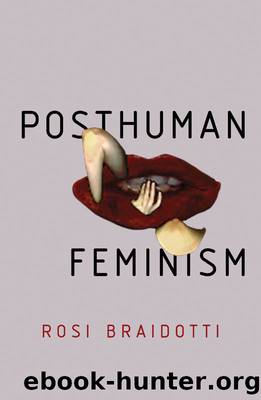Posthuman Feminism by Rosi Braidotti

Author:Rosi Braidotti [Braidotti, Rosi]
Language: eng
Format: epub
Tags: Social Science, Feminism & Feminist Theory, Sociology, General
ISBN: 9781509518081
Google: gi2GAQAACAAJ
Publisher: Wiley
Published: 2022-01-25T04:27:59+00:00
De-naturalization Re-naturalized: Dolly the Sheep
Posthuman feminism, as an accelerating combination of feminist technoscience studies and materialist ecofeminism, brings the social-constructivist tradition to a paradoxical point of implosion. Sarah Franklinâs work is emblematic of this approach to matter as biocultural entity that blurs the distinction between the new biologies, the technologies and dominant cultural codes âlike gender, sex and speciesâ (2007: 3). She argues that there are no real natural, material, factual or biological facts that exist entirely independent of technologically mediated human action. This creates a âtransbiologyâ, in her words âa biology that is not only born and bred, or born and made, but made and bornâ (Franklin, 2006: 171).
Two parallel lines of enquiry emerge from this radical de-naturalization of biology. A political anatomy of bio-genetic capitalism on the one hand, and the queering of biology, the life sciences and kinship systems on the other. Both lines are relevant for the posthuman turn. The conversion of nature into techniques leans to an explosion of âtrans-hybriditiesâ or transgenic organisms that undo traditional understandings of biology, nature and genealogical descent. In the broader frame of contemporary genetic capitalism, reproductive technologies are not primarily about reproduction, or even the desire for a child as such, but about capitalizing on the vitality of matter and about social redefinitions of kinship systems.
The political anatomy of bio-genetic capitalism is often presented through the case study of Dolly the sheep. Or rather, Dolly the living techno-artifact, produced by the scientific technique known as somatic cell nuclear transfer (SCNT) or the âsecond creationâ as it is called. This non-human technobody centres on a vast reproductive mechanism that has been thoroughly disassembled and rearranged. The genetic stem-cell material emerging from IVF spins off in a number of significant directions: genomic databanks, stem cell research, regenerative medicine, etc. These are huge transnational markets that capitalize on life as surplus (Cooper, 2008); it is capital in the age of the politics of life itself (Rose, 2007).
Dolly the sheep points to queering the possibility of genealogy and kinship. Dolly is a trans-entity, of mixed sex and deviant biological origins, with genetic material from unrelated organisms, mixed, sampled and re-sequenced. In its making, genealogy implodes into a series of sub-sets of technological practices or protocols. Designed and made, grown and built, rather than bred and born, Dolly is for Franklin âtrans-viableâ as the prototype of âqueer ancestryâ (2007: 29). Dolly is the cyborg embryo of the transbiology era, inaugurating a queer lineage.
From a posthuman perspective, Dolly as the emblem of denatured and modified biology gives new insight into the vitality of matter. Vitality refers to the regenerative potential of cells, right across human and non-human species, which is the target of bio-medical research, regenerative medicine and technologically assisted reproduction. In other words, Dollyâs body is a mediated kind of vitality: both zoe and techno, and in flows of transition between them. As Preciado astutely put it: âThere is nothing to discover in nature, there is no hidden secret. We live in a punk hyper-modernity.
Download
This site does not store any files on its server. We only index and link to content provided by other sites. Please contact the content providers to delete copyright contents if any and email us, we'll remove relevant links or contents immediately.
The remains of the day by Kazuo Ishiguro(9000)
Tools of Titans by Timothy Ferriss(8396)
Giovanni's Room by James Baldwin(7346)
The Black Swan by Nassim Nicholas Taleb(7129)
Inner Engineering: A Yogi's Guide to Joy by Sadhguru(6796)
The Way of Zen by Alan W. Watts(6614)
The Power of Now: A Guide to Spiritual Enlightenment by Eckhart Tolle(5783)
Asking the Right Questions: A Guide to Critical Thinking by M. Neil Browne & Stuart M. Keeley(5775)
The Six Wives Of Henry VIII (WOMEN IN HISTORY) by Fraser Antonia(5515)
Astrophysics for People in a Hurry by Neil DeGrasse Tyson(5190)
Housekeeping by Marilynne Robinson(4449)
12 Rules for Life by Jordan B. Peterson(4305)
Ikigai by Héctor García & Francesc Miralles(4274)
Double Down (Diary of a Wimpy Kid Book 11) by Jeff Kinney(4272)
The Ethical Slut by Janet W. Hardy(4253)
Skin in the Game by Nassim Nicholas Taleb(4250)
The Art of Happiness by The Dalai Lama(4130)
Skin in the Game: Hidden Asymmetries in Daily Life by Nassim Nicholas Taleb(4007)
Walking by Henry David Thoreau(3962)
